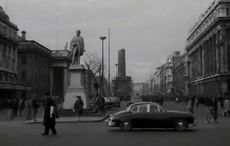| Departures at Dublin Airport |
Here's how it works in Ireland. If you have basic competency and can sit upright at a desk without falling over you could have a lifelong career in government or the civil service, say.
But you’ll need contacts. If you know someone who knows someone, you’ll go far.
It’s the only way you’ll go far, in fact. In Ireland, contacts are king. Talent is almost always surplus to requirements.
There’s a good reason for this. Talented people have a way of joining a group of perfectly contented people and inspiring them to create positive opportunity and change. That’s what makes talented people so irritating.
We just don’t like change in Ireland. Any kind of change, political, social, religious, philosophical or scientific.
In fact, we dislike change so much we were the last nation in Europe to join the Industrial Revolution and the modern age. Even then we took our time.
For most of the 20th century Eamon de Valera’s fondest wish for us was to return us back to the 15th. You know, back before all that bother with Queen Elizabeth and the Planters.
Read more on the immigration issue here
Back before things got complicated. Back to when maidens danced at the crossroads and we were poor but happy.
He didn’t succeed. It was enough he tried.
If sentimentality and hogwash are the twin poles of Irish political life, and they are, then basic practicality is the third rail that you must never ever touch.
Practicality implies change. Change is unpredictable.
It’s not because we’re stupid. We’re among the most sophisticated people on the planet.
It’s not because we’re lazy. Irish people have a work ethic that surpasses many Europeans.
It’s not because we’re misguided. We know nonsense when we see it.
It’s because for centuries we have been forced to occupy the passenger seat as a much more powerful nation or institution drove our national car.
It took us centuries to drive out the empire that put our ancestors to the sword, that purloined our land, that made us the tenants in our own nation and all but eradicated our language.
And what did we do when they were gone? We reflexively wrapped ourselves up in another empire.
We exchanged royalty for papacy. The horse changed riders but the lash, as Yeats wrote, went on.
For centuries we watched foreigners in fabulous crowns and jewels and then crosiers and cassocks write our story and tell our story and shape our story.
In fact we waited so long to tell our story ourselves that now that the time has come -- and the time has come -- we’re dumbstruck.
Read more: Barack Obama to meet unions and immigration lobbyists in support of his reform plans
How else to explain the curious resignation and silence that is the hallmark of Irish national life?
How else to explain the silence over what befell our neighbors during the Famine, the silence over who did what during the Civil War, the silence over who inherited and who got shafted, and the silence now over the tens of thousands forced to emigrate -- to pack up all their hopes and dreams in an stuffed suitcase -- and leave possibly never to return?
We’re dumbstruck when we should be roaring. Because Ireland is in a crisis like never before.
It’s hemorrhaging a new generation as its citizens are forced to foot insurmountable banking bills they did not run up, while the hopes and dreams of our emigrants are lost to the airports and the ferry docks.
Our political class has always expected you to leave in silence because by God, if you’re honest, you always did. Maybe you were glad to go too, after one too many nights spent looking into shop windows at all the things you couldn’t afford and would never.
But you didn’t expect to miss the other things quite so much, like the craic and your old pals and the view from the top of the hill head and the local lough, eh? That was an unexpected and sore old hoke, wasn’t it?
Eamon de Valera once thought that if you stayed at home you’d probably be happy enough with the All-Ireland and the Premier League and your wee pint on a Friday. Like the dutiful and comely little drones you are. He knew that real revolution, politically or socially, wasn’t Ireland’s style.
After all, even the 1916 Rising had the seeds of its own ineffectiveness seemingly written into the plan. Because in Ireland we habitually prefer gestures and symbolism to strategy and fact.
There’s much more wiggle room when things are various. There's more cover, too. It’s how we roll.
But somehow along the way we’ve somehow become the caretakers of our own destiny, not the authors of it.
We have allowed our political class and our out of touch establishment to become more like museum guards than political leaders. Just as in a museum, they know how to silence us when we get too rowdy.
But it’s becoming increasingly apparent they no longer know how to make change.




Comments